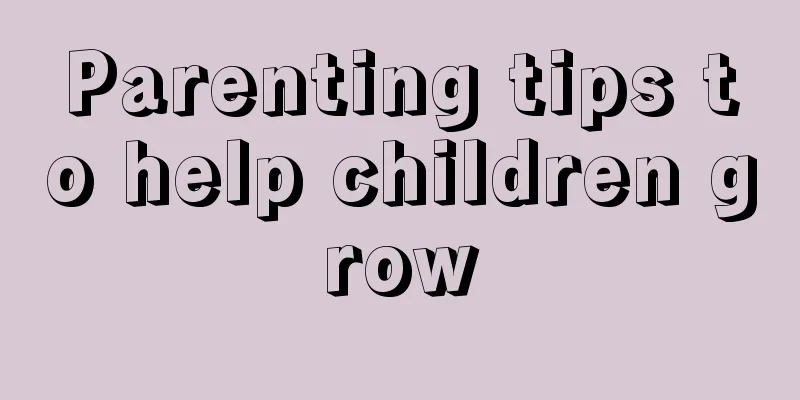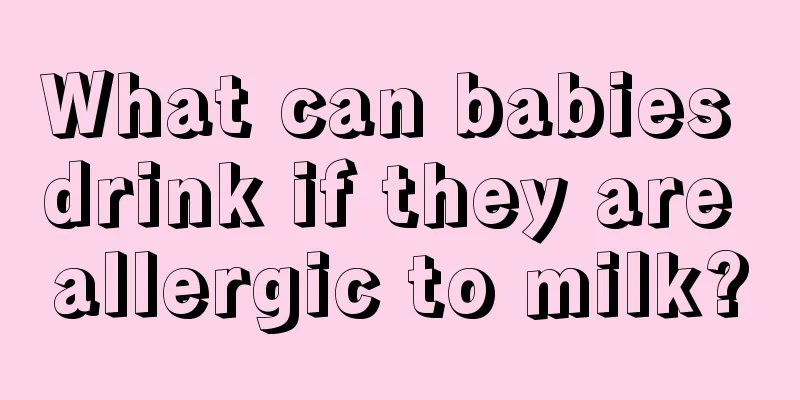Why is my three-year-old baby vomiting?

|
The digestive system of a three-year-old baby is not fully developed, and it cannot completely digest many foods. At this time, if adults give them something difficult to digest, it is very likely to cause the baby to vomit or have diarrhea. This is a gastrointestinal problem. You can consult a pediatrician to prescribe some medicine to help relieve the baby's vomiting. I hope your baby will recover soon. Among the various reasons, the most important ones are: 1. Improper feeding or eating: Overfeeding during the neonatal period, improper milk formula, swallowing large amounts of air while feeding; infants and young children eating large amounts at one time or food that is difficult to digest. 2. Abnormal digestive function: Systemic infectious diseases. If you suffer from upper respiratory tract infection, bronchitis, pneumonia, sepsis and other diseases, you will often experience vomiting along with high fever, nausea, loss of appetite, etc. 3. Digestive tract infectious diseases: gastritis, enteritis, dysentery, appendicitis and other diseases can cause reflex vomiting due to local irritation, which is often accompanied by other digestive system symptoms such as nausea, abdominal pain and diarrhea. 4. Neurological diseases: Central nervous system diseases such as encephalitis, meningitis, intracranial hemorrhage or tumors, and craniocerebral trauma can also cause vomiting, which is characterized by no nausea before vomiting and projectile vomiting, but is often accompanied by other symptoms of the nervous system, such as headache, mental depression, drowsiness, and even convulsions and coma. 5. Mental factors: Some children may vomit due to excessive mental stress or anxiety caused by certain reasons. Recurrent vomiting is sometimes related to mental factors. 6. Poisoning: including various poisonings, such as food poisoning, poisonous animals, plants, drugs, pesticides, etc., almost all of which have vomiting symptoms, but different poisonings have their own clinical characteristics for identification. 7. Others: Vestibular dysfunction of the inner ear or Meniere's disease (hydromatous accumulation in the inner ear membrane and labyrinth) causes severe vomiting, but is often accompanied by vertigo and visual rotation; congenital gastrointestinal malformations in children, such as gastric torsion, hypertrophic pyloric obstruction, etc. In addition, vomiting is also severe in children with intestinal ascariasis who have intestinal obstruction or biliary ascariasis. In addition to indigestion, vomiting in babies may also be caused by catching a cold during the day. Parents must pay attention to weather changes, add clothes to the baby in time, and do not eat too much raw, cold, or irritating food, otherwise it will cause damage to the baby's stomach and is not conducive to the baby's healthy growth. Pay attention to the cleanliness of the diet at ordinary times. |
<<: What is the appropriate temperature for a newborn baby to take a bath?
>>: What should I do if my child sweats a lot?
Recommend
How many of the three major shortcomings in educating babies do you have?
When educating your baby, there are many things t...
What to do if nephrotic syndrome relapses in children
For many families, the health of their children i...
What are the symptoms of nasal polyps in children?
This may be the first time you have heard of the ...
What causes bleeding in children's ears?
Ear bleeding should be treated immediately becaus...
Children eat dragon fruit and their urine turns red
The nutritional value of pitaya is very high. It ...
What to do if a 20-day-old newborn gets angry
Getting a fever is a particularly common symptom....
Why is the baby's palms hot but his forehead is not?
The baby's body temperature changes very quic...
What color is jaundice poop?
Jaundice is common in newborns, especially in bab...
How does Traditional Chinese Medicine treat anemia in children?
In fact, many people have explored the issue of a...
What to do if your baby's temperature is 38.5
Fever in children is a common condition and can b...
How to increase height of children
For the current generation of new parents, after ...
Neonatal suction negative pressure
Although many mothers are particularly attentive ...
What to do if your child has red and swollen gums
Children's teeth are in a developmental stage...
Newborn baby sneezing with runny nose
Sneezing in newborns is a relatively common pheno...
Ten-month-old baby always sleeps due to pneumonia symptoms
Newborn babies have just come into this world fro...









